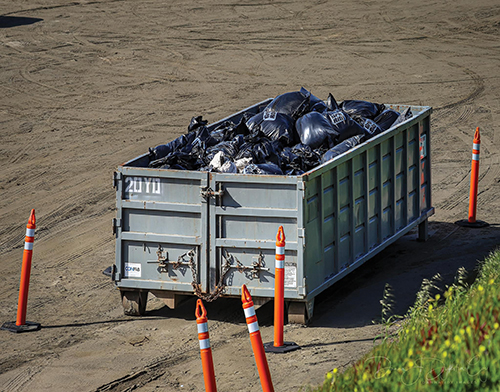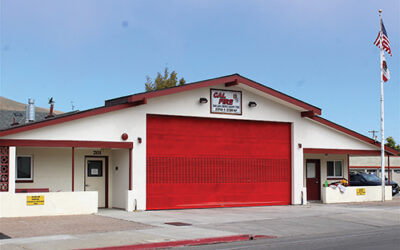A container full of cotton bales removed off beaches by CA State Parks. Photo by Danna Joy Dykstra-Coy
Those who live by the ocean would not be surprised to see oddities washed up with the high tide, and recent discoveries along North Coast beaches are evidence of this peculiarity of the Pacific.
Starting around March 1, residents have reported finding large, bales wrapped in blue plastic washed up on North Coast beaches.
“We’ve been getting calls yesterday and today,” Sheriff’s spokesman Tony Cipolla told Estero Bay News, which contacted the Sheriff’s Department because whenever something odd happens it seems they are usually the first ones who get called out. But this isn’t their concern.
“My understanding,” Cipolla said, “is that State Parks is handling it since it’s in their jurisdiction.”
Chief Ranger for the State Parks’ SLO Coast District, Eric Hjelstrom, confirmed that they had been called out for these odd bales when they’ve been discovered on State Parks’ beaches. “Where we can pick them up we do,” he said, adding that as of Feb. 5 “there are a lot that we haven’t picked up yet.”
He said he was were aware of around 10 bales of what’s turned out to be just cotton, that he was aware of district wide — from Montaña de Oro to Ragged Point.
He said he didn’t know how many total have been found, as they are apparently turning up in areas outside State Parks’ jurisdiction, too. “I don’t know how many” total there have been, he said. State Parks called in the Highway Patrol to help with the matter and investigate where they are coming from, as Hjelstrom said it’s not their jurisdiction to investigate where they came from.
He said they hope the owners of the bales will come get them, but otherwise, their plan was to try and put together a cleanup crew to retrieve the bales, and if that fails, they will have to go down and get them themselves. And so far, he said, they’ve found “no evidence of contraband” inside the bales.
Stuffing items such as these with caches of illegal drugs — cocaine, heroin, Fentanyl — is a common trick of drug cartels seeking to smuggle their poison into the U.S. But it may be that these bales were exports, not imports.
Sheriff’s spokesman, Cipolla, had one clue as to where they are coming from. “Apparently,” Cipolla told EBN, “Coast Guard confirmed sometime in February that a large shipment of cotton fell off a ship and those are now washing up on our shores, in particular Northern San Luis Obispo County beaches.”
Cargo falling off ships in raging storms like those in early February is also not uncommon.
Also washing up have been empty wooden barrels that one discoverer said smelled like whiskey.
EBN contacted Coast Guard Dist. 11 in Long Beach about the matter and a spokesman issued a news release. “U.S. Coast Guard Sector Los Angeles-Long Beach,” said PA3 Richard Uranga, “received a report from Cal Fire regarding an unidentified bale that washed ashore at around 5:06 p.m. Saturday [March 2].
“The bale washed ashore approximately 100-feet north from the Cayucos Pier in Cayucos. Cal Fire initially called California Highway Patrol about the bale and CHP responded to the area.”
He added that Coast Guardsmen from Morro Bay also responded. “U.S. Coast Guard sent law enforcement personnel from Coast Guard Station Morro Bay to support CHP in securing the area from the public. CHP discovered that the bale contained cotton inside.”
Since then, sightings have been posted online to the gossip site, Next Door, regarding the bales being found on the Sandspit, in Cayucos and in Piedras Blancas, where one washed up at the Elephant Seal Rookery.
At least one had had “Cotton USA” printed on it, according to a report in The Tribune. According to the website for Barnhardt Purified Cotton, a standard cotton bale in the U.S. measures 54-inches long, 20-inches wide and a tie width of about 33 inches, yielding some 17-cubic feet of cotton fiber. And, the standard U.S. cotton bale weighs some 480 pounds, but likely more when saturated with water.
What are these bales worth? According to Barnhardt, cotton fiber (with seeds removed) was in 2019 trading at roughly 75¢ a pound, so a 480-lb bale is worth roughly $360.
Chief Ranger Hjelstrom said the elephant seal rookery bale will be tricky to retrieve, as the rookery is now packed with the behemoths for pupping season.
In the past, many unusual things have washed ashore — from sea creatures like by-the-wind-sailors, dead marine mammals, and moon jellyfish, to contraband like bales of weed — which were lost or ditched by smugglers plying the Coast in Panga boats.
If readers walking the beaches should find one of these bales, they should contact local police (non emergency) to report the find.



